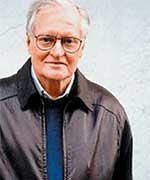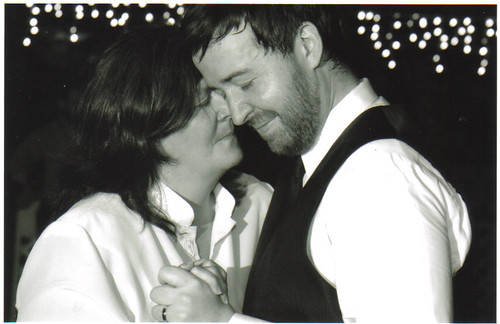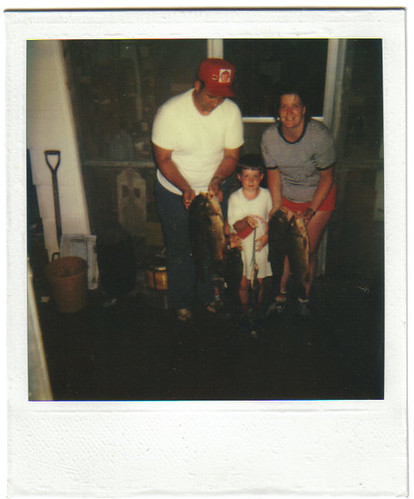
WASHINGTON, DC — One of America's most beloved landmarks, the Washington Monument, became all the more stirring and innovative Monday with the addition of New American poet John Ashbery.
Ashbery, 79, winner of countless literary awards and perpetual possible nominee for a Nobel Prize, was bolted to the pinnacle of the 555-foot monument and affixed with display spotlights for night viewing. He will remain there permanently, on 24-hour display.
"Ashbery has shown himself to be a pillar of strength and courage who brings out the critic in us all," said Harold Bloom, distinguised professor emeritus at Yale. "He was an inspired swerve away from the intentions of this already impressively virile monument. Once the idea was presented, nothing could stop us: not logistical problems, not budget constraints, not even the teary objections of Mr. Ashbery."
The Harvard graduate and beloved NY School poet and his trusted servent Jeffrey were hoisted up the side of the towering obelisk by a tractor-powered cable pulley. Ashbery was then welded to the pinnacle, facing east toward the Capitol, and bolted in place with iron slugs made from the same cage used to hold Ezra Pound after World War II.
A bronze plaque at the foot of the monument describes Ashbery's history and dimensions. It reads: "We elevate you to the heavens, so that future generations may know of your courage and your almost total appropriation by all contemporary poetry camps. We thought we could put all of this down, that would be one way. And next the thought came to us that to leave you out in the open would be another, and truer, way."
A crowd of almost 100,000 people, including many of Ashbery's countless imitators, gathered to watch the heartstrings-tugging installation. "It was so beautiful," said Tony Tost, author of the vaguely Ashbery-esque Invisible Bride. "As the final welders were blasting away, the sparks were flying everywhere, and then they set off those fireworks. I honestly cried."
"I brought the kids here to try and teach them about the courage and fortitude Washington showed at Valley Forge," said Chris Vitiello, a father of two from Durham, NC. "Now, with John Ashbery up there, the whole scene just speaks -- very coyly -- for itself."
Vitiello added : "I wish I had the courage to be indeterminate like that."
"You can fly... you belong in the sky...," sang celebrity blogger Ron Silliman, in a musical prelude to the formal dedication and attachment ceremony. "Once upon a time, my dear near-contemporary John flew into my own geneaology with the Tennis Court Oath, soaring above the quietest peaks. Though today he's wearing several hundred pounds of wine-paunchiness instead of his old experimental tights, from the top of this monument he shall forever soar."
Though Ashbery was unable to speak at the commemoration due to an intense fear of heights, no one was more moved by the ceremony than the poet himself. "Please let me down," the visibly touched literary lion said to reporters. "I'm cold, and I miss my apartment."
Upon Asbhery's natural death, he will be removed from the monument long enough to be encased in acrylic plastic, then reattached.
Ashbery's installation, planners say, will give him a new ability to touch and influence poets 24 hours a day as a public fixture, rain, snow or shine. "Ashbery touched us all with his heartfelt rewriting of the Romantic and Modernist traditions," Silliman said. "As it is, the School of Quietude have had to cripple their own poets to gain a comparable amount of emotional impact."
Pulitzer Prize winning poet Charles Wright's spine was shattered by Dana Gioia in August, gaining him many standing ovations at AWPs since.
This is not the first time a poetic notable has been added to a Washington, DC, attraction. Robert Creeley spent the last few months of his life in the Sillimanian Institute's Wax Museum of Artistic Innovation, in a glass case between Marlon Brando's jacket from The Wild One and the original lineup of Pere Ubu. Robin Blaser now occupies the case.
In light of the project's success, The U.S. Department of Parks and Services is considering similar additions to its attractions. Plans are already being drafted to have Bruce Andrews bolted to the Lincoln Memorial.







